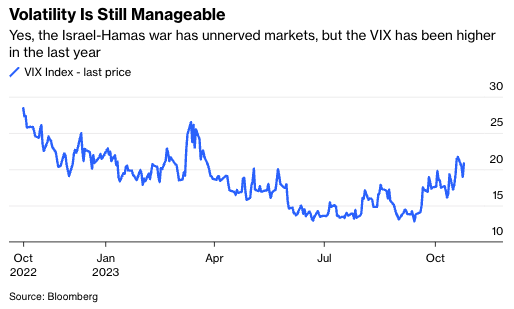Despite the continuing war in the Middle East, most markets have been relatively calm. Stock exchanges have not plunged, while volatility appears manageable, indeed ordinary. If you were looking at just the markets (except for Israel’s), you might not even know there is a war on.
The question is what to make of such data. Allow me to make a daring inference: At least for the time being, the assumption is that the current conflict will not widen into a much larger war. It may pull in Syria, Lebanon, Yemen and other parties, but so far markets are indicating that the Israel-Hamas war will not much disrupt most of the world’s large economies.
There is one very important caveat: This is an ex-ante analysis. Markets are wrong all the time, but they are also often the best predictive tool available. Consider the Super Bowl. Before the game, the betting odds are usually the best indication of who is favored and by how much. Every single time, those odds end up being wrong: By the end of the game, one team is 100% likely to win, and the other team 100% likely to lose. Still, the odds were the best available predictor before the game started.
The same kind of logic can be applied to the Israel-Hamas war. The current odds of a much greater conflagration will change all the time, just as market prices do. So I am not making an absolute geopolitical prognostication. Rather, I am pointing to the best measure of the odds at the moment.
It is sometimes said that markets do not predict wars very well. But that is like saying the underdog sometimes wins the Super Bowl, which is of course true.
It is not true that markets ignore war. For instance, the value of the Israeli shekel is down sharply since Oct. 7, reflecting that many parts of the Israeli economy have come to a standstill, and that the country will experience more serious fiscal problems in the future. Just after the Hamas attack, there was an immediate 4% spike in oil prices, which is significant but not a game-changer.
There is a lot of evidence suggesting that markets incorporate other consequences of war. For instance, the Iraq war had sizeable impacts on U.S. travel stocks, as well as shares in the Turkish and Israeli markets. So don’t think markets are asleep at the moment. The marginal investor is watching—and deciding not to overreact.
Markets do tend to take a long-term perspective, and don’t always panic in response to events. Think of all the major historic geopolitical events that led only to small changes in U.S. stock markets. In most or all of these cases, the market was right not to overreact, as over time the value of U.S. companies has, for the most part, continued to rise. The two biggest negative market reactions came after the Pearl Harbor attack in December 1941 and the North Korean invasion of South Korea in June 1950. Both events actually did threaten the prevailing world order (in the 1950s, the U.S. considered using nuclear weapons and invading China).
When it comes to tensions between Israelis and Palestinians, conflicts have been bearish for Western markets, though not usually to a highly significant degree.
Sometimes markets are prescient. Asset prices started to reflect some of the implications of the Russian attack on Ukraine as many as 50 days in advance. Other times markets are truly surprised, as for instance by Sept. 11. But again, remember that analogy with the Super Bowl. There are truly terrible events that are in fact improbable, and the markets recognize them as such in advance.
In a time of so much death, destruction and suffering, I hesitate to call all this good news. Maybe call it not-as-bad-as-it-could-be news. I’m not trying to talk anyone into absolute calm here. The existing conflict is terrible enough, and a much broader one still is possible. That’s one reason the shekel is down.
But if you find yourself doom-scrolling through the news, try scrolling through some securities prices instead—because they will offer a more balanced view of the (still significant) risks. Those prices may be wrong at any given moment, but that is why they are always changing. They are trying to send a message about what the future holds. And if nothing else, scrolling through securities prices might help you keep your social-media feed in perspective.
Tyler Cowen is a Bloomberg Opinion columnist, a professor of economics at George Mason University and host of the Marginal Revolution blog.








